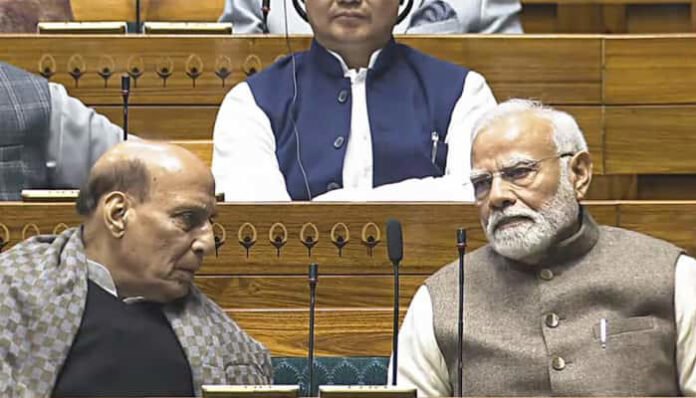New Delhi, December 14, 2024 — Prime Minister Narendra Modi is set to deliver a key address in the Lok Sabha today during the Winter Session of Parliament, as part of an ongoing debate commemorating the 75th anniversary of the Indian Constitution. The debate, which began on December 13, has been marked by intense exchanges between ruling BJP leaders and the opposition, highlighting the ideological and political divides shaping India’s current political landscape.
Context of the Debate
The special discussion on the Constitution was initiated by Defence Minister Rajnath Singh, who accused the Congress party of attempting to “hijack and appropriate” the Constitution’s legacy. Singh’s remarks emphasized the BJP’s stance that the Constitution belongs to all Indians and not any single political group or ideology.
Congress MP Priyanka Gandhi Vadra, making her maiden speech in Parliament, strongly countered these claims. She underscored the Constitution’s role as a “protective shield” for justice, equality, and freedom. Vadra accused the BJP of undermining constitutional values through policies that allegedly weaken reservation protections and create an atmosphere of fear and intimidation.
Political Tensions and Major Themes
The debate has spotlighted sharp ideological clashes on constitutional interpretation and its application in contemporary governance. BJP leaders have used the platform to criticize the Congress for historical decisions they claim compromised constitutional principles, such as the Emergency period and alleged missteps in implementing social justice measures. On the other hand, the opposition has accused the ruling party of eroding democratic institutions and failing to uphold constitutional protections for marginalized communities.
Key points of contention include:
- Allegations of the BJP misusing investigative agencies against dissenters.
- Opposition demands for a nationwide caste census to address social inequities.
- Concerns over privatization and lateral entry into government roles, which opposition leaders claim undermine reservation policies.
Expectations from PM Modi’s Address
Prime Minister Modi’s speech is expected to cover the following key areas:
- Reinforcing Constitutional Values: The Prime Minister is likely to emphasize the role of the Constitution in uniting India’s diverse population and safeguarding democracy. He may also reaffirm his government’s commitment to constitutional principles.
- Countering Criticism: Modi is anticipated to respond to opposition accusations of undermining institutions and constitutional adherence, framing his government as the true custodian of the Constitution’s legacy.
- Vision for India’s Future: Highlighting the “Viksit Bharat by 2047” initiative, Modi is expected to outline a roadmap for economic growth, social justice, and technological innovation, tying these goals to the values enshrined in the Constitution.
- Focus on Reforms: Legal and administrative reforms, including discussions on the Uniform Civil Code, are likely to feature prominently in his address.
- Social Justice: Modi may highlight government initiatives aimed at empowering marginalized communities and promoting gender equality.
Priyanka Gandhi’s Maiden Speech
In her maiden speech, Priyanka Gandhi Vadra delivered a scathing critique of the BJP’s governance. She accused the ruling party of systematically dismantling constitutional safeguards and called for bold measures like a caste census to address social inequities. Her calm yet assertive delivery drew comparisons to her grandmother, former Prime Minister Indira Gandhi.
“This country cannot run on fear. The Constitution is a document of hope and justice for all Indians, and we will not allow it to be undermined,” she declared. Vadra’s speech resonated strongly with opposition leaders and has been lauded as a significant moment in her political career.
Implications for Government and Opposition
For the Government:
- Public Perception Management: The debate allows the BJP to position itself as a defender of constitutional integrity, countering accusations of authoritarian tendencies.
- Narrative Building: By invoking historical references and framing opposition criticisms as baseless, the government aims to strengthen its narrative ahead of upcoming elections.
For the Opposition:
- Highlighting Alleged Failures: The Congress and allied parties are using the platform to spotlight perceived governance failures, including concerns over social justice and institutional autonomy.
- Rallying Unity: The debate has become a rallying point for opposition parties to present a united front against the BJP.
- Galvanizing Support: By framing demands like a caste census within the context of constitutional rights, the opposition seeks to mobilize marginalized communities and expand its voter base.
Continuation of the Debate
The Lok Sabha debate will conclude today, while a similar discussion is scheduled in the Rajya Sabha on December 16 and 17. These extended sessions underscore the importance of constitutional issues in contemporary political discourse.
The Constitution debate marks a pivotal moment in Indian politics, providing both the government and opposition with a high-profile platform to articulate their visions for the nation. As Prime Minister Modi takes the stage today, his address is expected to set the tone for the government’s approach to constitutional matters while responding to criticism from a reinvigorated opposition. The outcomes of this debate could significantly influence India’s political landscape as it moves toward crucial state and national elections.



